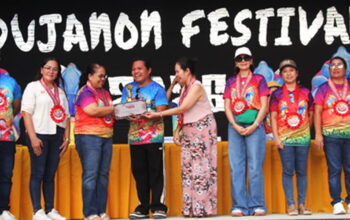
LOCAL animal health and government officials rally Boholanos to hold hands tighter to form a chain that should deny the entry of a virus that can totally decimate the P5.6 billion largely backyard industry in Bohol.
African Swine Fever (ASF) virus, that which causes ASF, cannot just walk or swim in, it has to be brought by someone irresponsible enough to be totally naïve to the implications of bringing in raw or processed pork, especially from disease-affected areas.
This fairly sums up the Provincial Veterinarian Dr. Stella Marie Lapiz’s statement during the recent Capitol Reports now institutionalized by Governor Erico Aristotle Aumentado as a weekly platform for Bohol media to get updated on government programs, projects and issues affecting governance and its policies.
Bohol has still in effect, an ordinance totally banning the entry of live, raw, processed pork and pork products, including the quarantine of feeds, if only to keep the island free from African Swine Fever (ASF).
Alarmed by yet unconfirmed reports of reported deaths of hogs in nearby Cebu, as quoted from a respected media personality in Cebu, Bohol animal health authorities and local officials scamper anew in another round of invigorated campaign calling travelers to Bohol to leave any raw pork, processed or cooked pork products when coming to Bohol or risk bringing the virus in.
Whether it is hog cholera, bacterial septicemia or the much dreaded ASF that manifests almost the same symptoms, measures still need to be put in place to insulate Bohol from the disease that has the capacity to kill the backyard industry that engages from 48,000 Boholano hog raisers who supply 80% of the local meat requirement.
Said to spread through carriers like processed infected pork and raw products, fomites, ASF has been 100% fatal once it infects a locality, exponentially spreading if biosecurity measures are not in place.
To its border biosecurity keepers, officials and animal health authorities urge to tighten the guards and prevent the entry of the virus, otherwise it would be a much bigger task, more expense and a food security crisis, according to Dr. Lapiz.
Keeping guard in its 11 ports and seaports and one airport are government paid animal quarantine inspectors who manually inspect hand carried items by entering passengers for possible smuggled meat and processed products, sniffing dogs, foot mats and disinfection teams spraying virus killing preparations to vehicles from outside Bohol transiting in, shares Animal Quarantine Services Officer and veterinarian Dr. Maria Eleonor Abisado, during the same forum.
Other than the decimation of the multi-billion backyard hog raising industry, commercial hog grower Marlito Uy enumerates huge market losses, which will definitely impact on livelihood and food security.
Contributing to the industry are two major commercial hog growers that supply 20% of the local demand for meat and are exporting these to supply the needs of ASF affected provinces.
Still producing a sizable percentage of pork and meat products rating a 251% self-sufficiency data over the local consumption, Bohol’s export industry on to the ASF affected regions would plummet if not hit rock bottom.
Over all, if the people continue to disregard ASF prevention measures, backyard raisers whose incomes are from live and raw meat sales, are its biggest victims. (rahc/PIA_7/Bohol)


